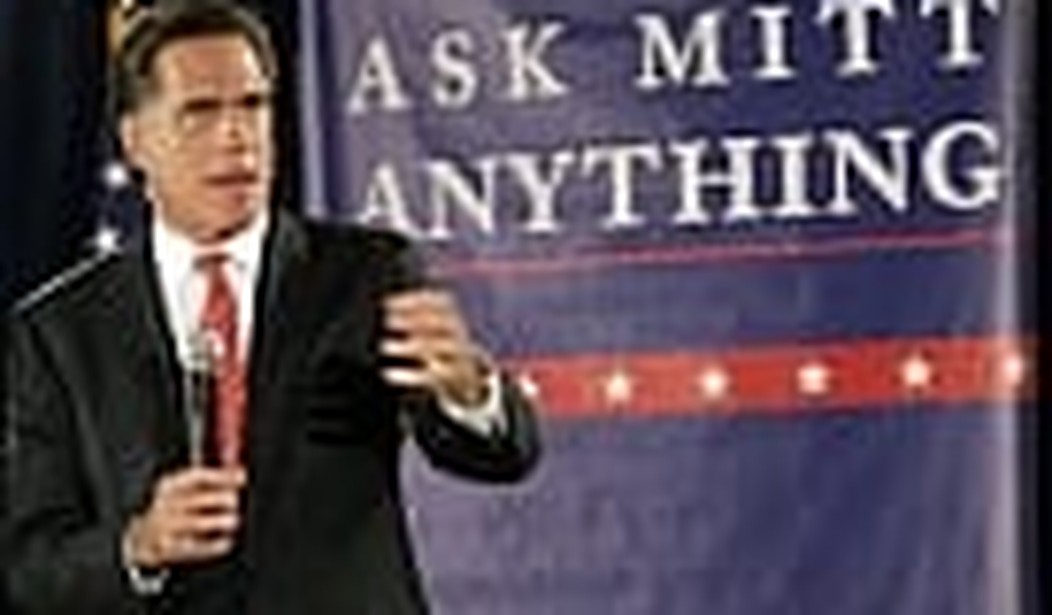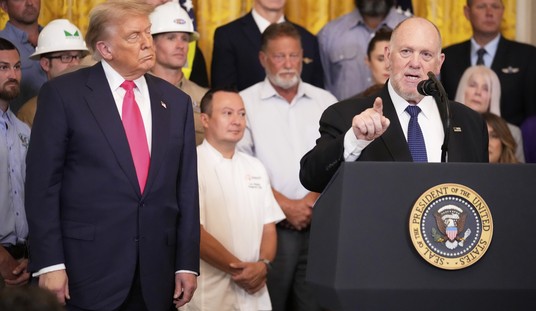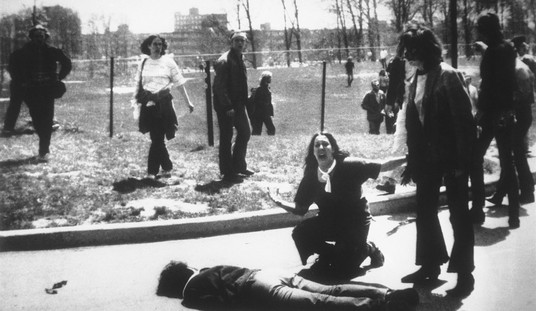Just what did GOP presidential candidate Mitt Romney say about appointing Muslims to his cabinet if he was elected?
This is what Mansoor Ijaz, writing in the Christian Science Monitor, says Romney told him when he asked that question at a recent fundraiser for the candidate:
I asked Mr. Romney whether he would consider including qualified Americans of the Islamic faith in his cabinet as advisers on national security matters, given his position that “jihadism” is the principal foreign policy threat facing America today. He answered, “…based on the numbers of American Muslims [as a percentage] in our population, I cannot see that a cabinet position would be justified. But of course, I would imagine that Muslims could serve at lower levels of my administration.”
What Romney seems to be saying is despicable – that he wouldn’t appoint a Muslim to his cabinet because they aren’t an important enough minority group due to their small size. And it isn’t the first time that Romney has been asked about having Muslims in his cabinet:
Romney made the comments three months ago at Lawry’s restaurant in Las Vegas, at a different event from the one chronicled in the Monitor op-ed. Aguirre says that she was at the event with local Republican George Harris, who asked Romney the relevant question. She described the exchange this way:
“His question was something to the effect of, `Considering the problems that we have with the Jihadist movement and the problems we have with the Middle East, would you consider having a Muslim as an adviser that can guide you as to what kind of decisions to make with regards to the Middle East?'”
“He said, `Probably not.'”Aguirre added that what Romney said next surprised her. “He said something to the effect of, `They’re radicals. There’s no talking to them. There’s no negotiating with them.’ I can’t remember the exact words he used, but that was the explanation. We left thinking, `Wow, what a racist comment. He automatically assumed that all Muslims are radical.'”
Harris, who is the Nevada GOP state finance chair, confirms Aguirre’s recollection of the incident although it is not clear if his statement about Muslims being “radicals” was given in the same context as bringing one into the cabinet.
It should be noted that in fairness to Romney, the questioner who asked him about Muslims in the cabinet and wrote the op-ed in CSM, Mansoor Ijaz, is not just some disinterested observer of politics in America. The guy is a fundraising machine for the Democrats. According to this piece from 1997 in the Washington Post, Ijaz was a powerhouse bundler for Bill Clinton’s re-election campaign. He has since donated another $200,000 including gifts to the Hillary Clinton Senate campaign and the Democratic Senate Campaign Committee. (Hat Tip: Ed Morrissey)
On Ijaz’s gift list, no Republicans need apply. Every cent he raised or donated went to Democrats.
This calls into question what Ijaz was doing at a Republican fundraiser for Romney in the first place. Whatever the reason, he certainly elicited a controversial response from Romney – at least the way Ijaz reported the incident.
But is that what Romney actually meant? The candidate tried to clarify the comment today. He said he didn’t mean that he would never appoint a Muslim to a cabinet post but rather he didn’t think the cabinet needed a Muslim in order to understand and confront extremist Islam:
“His question was, Did I need to have a Muslim in my Cabinet in order to confront radical jihad, or would it be important to have a Muslim in my Cabinet?’ And I said no, I don’t think you need a Muslim in the Cabinet to take on radical jihad any more than we needed a Japanese American to understand the threat that was coming from Japan or something of that nature.”
Romney continued, “It’s something I rejected, number one. And number two, point out that haven’t given a lot of thought to the people I would have in my Cabinet. I don’t have boxes I check off in terms of ethnicity, and it’s not that I need a certain number of people representing ethnic groups. Instead, I would choose people based on their merits… I’m open to having people of any faith, ethnic group. But they would be selected based on their capacity and capabilities and what they could bring to the Administration, but I don’t choose people based on checking off a box.”
So Romney doesn’t believe he needs a Muslim in the cabinet to help him understand Islam and will choose people based on merit and not race or religion.
Comforting but hardly the point. The candidate did not address what he meant by his initial remarks regarding Muslims not being a large enough minority to “justify” their inclusion in his cabinet.
Did Democratic fundraiser Ijaz simply make that part up? He swears to Jim Geraghty at NRO that the quote is accurate, including the part about Romney rejecting the idea of a Muslim cabinet member based on “numbers of American Muslims [as a percentage] in our population.”
And then there is the second incident which also seemed to suggest that Romney was reluctant to appoint a Muslim to his cabinet for any other reason than the candidate, regardless of their religion, would be qualified.
Obviously, the situation is confused with contradictory statements seemingly irreconcilable with each other being presented as what the candidate said and what he meant.
And what makes Romney’s comments even more perplexing is all the trouble the candidate himself has had with the question of religion. Mitt Romney is the first Mormon to have a serious shot at becoming President of the United States. With such a monumental misunderstanding of what Mormonism is and what Mormons believe abroad in much of Christian America, the candidate has been faced with a whispering campaign by some that is reminiscent of the last time religion roiled a presidential campaign.
John F. Kennedy’s Catholic faith was still an issue in 1960. But anti-Catholic bigotry – an American staple from the time of the Puritans – was on its last legs as Irish Americans had finally become accepted and were moving into positions of considerable political and corporate power. But in the protestant south, there was still suspicion directed toward any “papist” who ran for president.
Kennedy had to prove to Kingmakers – even Catholic ones like Mayor Richard Daley in Chicago – that his Catholicism would not be a liability in a general election. The first test of his viability was in the West Virginia primary where his main rival, Hubert Humphrey, tried to play the old “Rum, Romanism, and Rebellion” card with elliptical references to Kennedy’s faith.
Kennedy fought back with both political savvy and a few dirty tricks of his own, trying to tar Humphrey as a draft dodger during WW II (a patently false smear) while addressing the issue of his Catholicism head on.
In what author Theodore H. White pointed to in Making of a President as a public appearance almost as important as JFK’s speech at the Ministerial Association of Greater Houston, Kennedy was asked point blank at a press conference about his religion. Rather than remain silent on the issue as he had in Wisconsin two weeks before, Kennedy framed the issue as one of fairness. He said “I do not believe that forty million Americans should lose the right to run for president on the day they were baptized.” In short, Kennedy challenged voters to prove they were not bigots by voting for him. It was a brilliant political stroke and Kennedy’s subsequent win effectively ended Humphrey’s challenge.
Later that fall in Houston, Kennedy buried the issue before one of the most conservative Protestant organizations in the country, the aforementioned Ministers group. In one of the more memorable lines, Kennedy once again, gives people a reason not to use anti-Catholicism as a reason to vote against him:
I believe in an America that is officially neither Catholic, Protestant nor Jewish-where no public official either requests or accepts instructions on public policy from the Pope, the National Council of Churches, or any other ecclesiastical source-where no religious body seeks to impose its will directly or indirectly upon the general populace or the public acts of its officials-and where religious liberty is so indivisible that an act against one church is treated as an act against all.
But Romney is in a much more delicate position than Kennedy with regard to religion. Despite the questions some people have about his own faith, it is even deadlier for a Republican to say anything that could be construed as supportive of the Muslim faith except in the broadest, most ecumenical way. And even then, a GOP politician is taking a chance.
Don’t believe me? Last month, nearly 20% of the Republican Congressional caucus voted “present” when asked to approve a resolution commending the country’s attention to the Muslim holiday of Ramadan.
And the unseemly row over the wish of newly minted Muslim Congressman Keith Ellison to use a Quran instead of a bible during his swearing in ceremony elicited a response from Virginia Congressman Virgil Goode in the form of a letter to his constituents that bordered on hysteria:
In his letter, which was dated Dec. 5, Mr. Goode said that Americans needed to “wake up” or else there would “likely be many more Muslims elected to office and demanding the use of the Koran.”
“I fear that in the next century we will have many more Muslims in the United States if we do not adopt the strict immigration policies that I believe are necessary to preserve the values and beliefs traditional to the United States of America and to prevent our resources from being swamped,” said Mr. Goode, who vowed to use the Bible when taking his own oath of office.
The problem, if you talk to members of the GOP base, is that there are is no such thing as a “moderate Muslim,” that even if all Muslims aren’t terrorists, so-called Moderate Muslims enable the killers by their silence and inaction. There’s also the belief that Muslims in America demand special treatment and that authorities bend over backwards to accommodate them while disrespecting Christians.
There is probably something to the latter criticism but to the religious right, it smacks of bending the knee to Muslims and acquiescing to some kind of “Sharia law.”
Hence, you have Romney basically twisting himself in rhetorical knots trying not to sound bigoted but at the same time, trying to avoid giving the impression he likes Muslims very much.
This has led to the current confusion over what he said, what he meant, and questions about what he actually believes about the issue of Muslims in his cabinet.
The GOP “Muslim problem” will be with the party as long as politicians keep catering to the worst instincts of their base.
And Romney won’t be the last politician who gets tangled up in the shallow bigotry of Americans who fear those who are different and who worship God in a way that is incomprehensible to them.










Join the conversation as a VIP Member